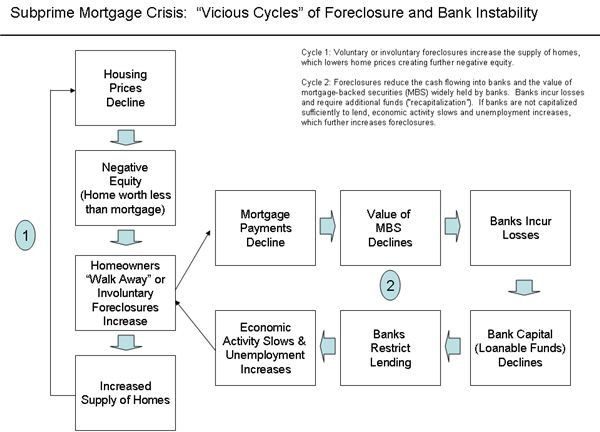How does the housing market create a recession?
The Domino Effect of Foreclosure
You may be scanning the economic news with discomfort and wondering to yourself, “How does the housing market create a recession?” You might view a downturn in the housing market as an effect of recession – as jobs become scarcer and both lenders and individuals become more conservative with their spending, there would be fewer buyers out there looking, bringing prices down.
Also, as more and more homeowners lose their jobs, they lose the ability to make their monthly mortgage payments. This hurts lenders’ ability to extend credit to others, and the people who own homes around foreclosed properties see their own property values decline.
A drop in property value may not seem like a short-term issue for homeowners who are not looking to sell anytime soon. In fact, the reduction in value can lead to lower property tax bills each spring.
The hidden domino effect has to do with equity. If you’ve been paying your 30-year note faithfully for five years, the truth is that you don’t have a whole lot of equity in your home yet. The vast majority of your payments, in the first few years of your loan, go to interest. If you’re not making extra principal payments, you’re not building up much equity.
So, if your property value plunges, you can end up upside-down (owing more than your equity is worth). This can make your lender very nervous, raising the likelihood of foreclosure proceedings if you fall a few months behind. And so one foreclosure can lead to many others in the same neighborhood during a recession.
The Other Victims of the Housing Market
When the housing market slows down, though, it’s not just the foreclosures that hurt the economy. If new home construction slows, a whole swath of the economy slows down as well. Construction companies and their suppliers all ratchet their operations back. When lenders get anxious about new loans, and credit tightens, there are fewer opportunities for homeowners to go out and spend money – either on buying a new home or improving their existing ones.
As a result, many retailers – home improvement stores and home decor retailers in particular – also experience a slowdown. As their employees feel the effects of the recession, their own ability to spend money in the housing market declines.
You might wonder, though, why declining home values might eventually lead the economy back to recovery. After all, if prices are down, people who were earlier priced out of the housing market should now be able to enter it, right?
The irony is that these lower-priced existing homes keep new homes from being built. The glut of foreclosures available on the cheap attracts buyers who might otherwise have ordered new construction, and so the vicious circle of low prices as a result of foreclosure continues, while the new home construction business (and all of its ancillary industries) also remains at a crawl.
Resources
Sources:
“Housing slump might usher in recession.” https://www.msnbc.msn.com/id/22189843/ns/business-stocks_and_economy/
“Recession is over? Not for the Housing market.” https://money.cnn.com/2010/09/20/news/economy/thebuzz/index.htm
Image Credits
Housing Crisis via Wikimedia Commons/Farcaster at en.wikipedia
